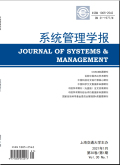系统管理学报2024,Vol.33Issue(4):890-900,11.DOI:10.3969/j.issn2097-4558.2024.04.004
考虑智能制造技术补贴的新能源汽车制造商定价策略
Competitive Pricing Strategies of Vehicle Manufacturers Considering Smart Manufacturing Technical Subsidy Policy
摘要
Abstract
The proposal of the"dual carbon"strategy further clarifies the development direction of new energy vehicles in the automotive industry,thus requiring them to achieve innovation and breakthroughs in intelligent manufacturing technology.In this paper,starting from the subsidy policy for intelligent manufacturing technology of new energy vehicles,and taking into consideration consumer purchasing preferences for new energy vehicles,a competitive pricing decision model for traditional and new energy vehicle manufacturers is constructed,and the optimal pricing and production strategies of automobile enterprises at different subsidy levels are solved.Moreover,the social welfare situation is analyzed,and numerical simulation and analysis are conducted on the model.The research results indicate that the subsidy policy for intelligent manufacturing technology of new energy vehicles has intensified market competition between traditional and new energy vehicle manufacturers,thereby lowering the prices of both types of vehicles.Faced with the competitive environment of new energy vehicles under subsidy policies,although the prices of traditional types of vehicles continue to decrease,consumer demand for them continues to decline.When the government focuses on considering the impact of environmental pollution,it should increase the subsidy level for new energy vehicles,and when consumers have asymmetric preferences for new energy vehicles and traditional vehicles,the government should reduce the level of technology subsidies to maximize social welfare.关键词
新能源汽车/智能制造技术补贴/定价策略/不对称偏好Key words
new energy vehicle/smart manufacturing technical subsidy/pricing strategy/asymmetric preferences分类
管理科学引用本文复制引用
陈宇靖,孙延明..考虑智能制造技术补贴的新能源汽车制造商定价策略[J].系统管理学报,2024,33(4):890-900,11.基金项目
国家自然科学基金资助项目(71801056,52275479) (71801056,52275479)
中国博士后基金资助项目(2022M710857) (2022M710857)
教育部人文社会科学项目(22YJC630011) (22YJC630011)

